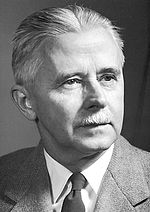No subscription or hidden extras
Read through the most famous quotes from Haldan Keffer Hartline
But what is more, if we have succeeded in adding to the basic understanding of our universe and ourselves, we will have made a contribution to the totality of human culture. ↗
One is that we stand - my two confreres and I - in some degree as representatives of a great number of fellow workers over the entire world, who are enthusiastically active in this field of ours. ↗
One works in one's laboratory - one's chaotic laboratory - with students and colleagues, doing what one most wants to do - then all this happens! It is overwhelming. ↗
#colleagues #doing #happens #laboratory #most
One of Hartline's graduate students at Johns Hopkins Paul Greengard later also won the Nobel Prize. in 1927.
Haldan Keffer Hartline ForMemRS (December 22 1903 – March 17 1983) was an American physiologist who was a co-winner (with George Wald and Ragnar Granit) of the 1967 Nobel Prize in Physiology or Medicine for his work in analyzing the neurophysiological mechanisms of vision. In 1940–1941 he was Associate Professor of Physiology at Cornell Medical College in New York City but returned to Penn and stayed until 1949. After attending the universities of Leipzig and Munich as an Eldridge Johnson traveling research scholar from the University of Pennsylvania he returned to the United States to take a position in the Eldridge Reeves Johnson Foundation for Medical Physics at Penn which was under the directorship of Detlev W.

